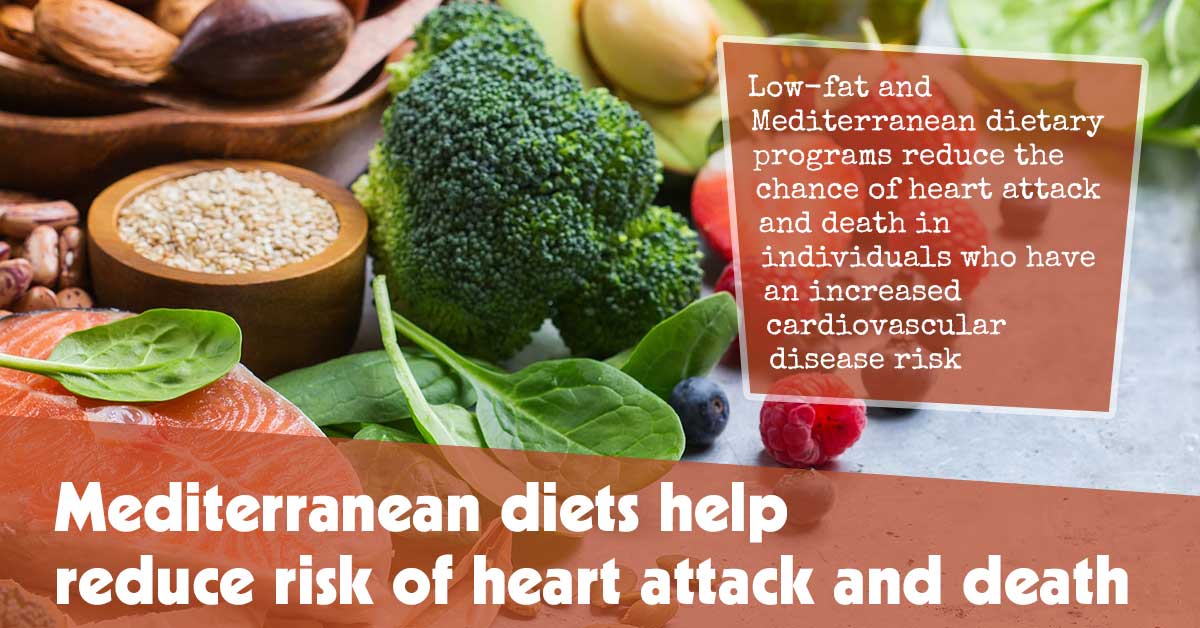Mediterranean Diets Help Reduce Risk of Heart Attack and Death

A comparative review of randomized studies of 7 popular dietary programs has found that low-fat and Mediterranean dietary programs reduce the chance of heart attack and death in individuals who have an increased cardiovascular disease risk.
Dietary programs are diets that include or don’t include exercise or other health behavior support such as smoking cessation.
Mediterranean dietary programs will also help to reduce the risk of stroke, but other dietary programs offer little or no benefit compared to minimal treatment such as diet or brief dietary recommendations from a health expert.
Various dietary programs are currently recommended for individuals with an increased cardiovascular risk, but these recommendations have generally relied on evidence of low certainty from non-randomized studies.
A few analyses of randomized controlled studies have indicated that some dietary programs and diets can help reduce major cardiovascular events, which include strokes and heart, but the beneficial impact on death remains unclear.
Therefore, databases were searched for randomized studies examining the impact of dietary programs on preventing major cardiovascular events and death in individuals who had an increased cardiovascular disease risk.
Forty eligible studies were identified that involved 35,548 individuals who were tracked for 3 years on average for 7 dietary programs: low fat, very low fat, Mediterranean, combined low sodium and low fat, modified fat, Pritikin, and Ornish. Two different diets such as low fat vs Mediterranean were compared n some studies.
Each trial’s methodological quality was assessed and 13 were judged to have a low overall risk of bias and 27 to have a high risk of bias.
According to evidence of moderate certainty, Mediterranean dietary programs were better compared to minimal treatment at preventing mortality from all causes with 17 fewer deaths per 1000 over 5 years, 17 fewer non-fatal heart attack deaths per 1000, and 7 fewer stroke deaths per 1000 for individuals having an intermediate cardiovascular disease risk.
Low-fat programs were also better than minimal treatment with moderate certainty for preventing mortality with 9 fewer deaths from all causes per 1000 and 7 fewer non-fatal heart attack deaths per 1000.
In comparison to each other, there were no significant differences between low-fat and Mediterranean programs for non-fatal heart attack or mortality.
The total effects of both dietary programs were more evident for individuals having high cardiovascular disease risk with 36 fewer deaths from all causes per 1000 and cardiovascular deaths were 39 fewer per 1000 in individuals following the Mediterranean dietary program for 5 years.
The other 5 dietary programs had generally little to no benefit in comparison to minimal treatment based on evidence of low to moderate certainty.
The study had a few limitations, which include not being able to measure dietary program adherence and the chance that some of the benefits could have been as a result of other factors within the programs such as smoking cessation support and drug treatment.
This was nevertheless a comprehensive review and as such the researchers conclude that low-fat and Mediterranean dietary programs could help reduce the risk of non-fatal heart attack and mortality in individuals with an increased cardiovascular disease risk.

Image from Max Pixel
Want to use our images on your site? Right click on image for embed code








